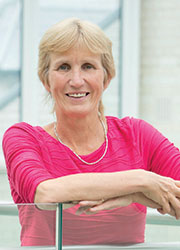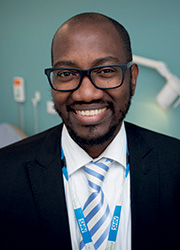

GP Lives: Championing Women's Health
Ewen Stewart has built his career on caring for people on the margins of society

A former GP partner now turned salaried GP in Glenrothes, Dr Ewen Stewart spent 17 years in Leith working with drug users.
“The practice cared for a lot of people who had problem drug use. It felt as if they were a group who were stigmatised and who didn’t always receive the best care, and that felt important to challenge. They are a group who can be hard to get to know, but when you do and you hear why they’re in the situation they are, you understand that it’s not just someone who has a problem but that their whole history has led them to that,” he explained.
“Listening to people’s stories is so important, and sometimes it’s hard to imagine how people have gone through those types of experiences. It can be troubling, but I think that the privilege of people sharing those stories with you is a kind of reward and helps you cope.”
Ewen became involved with the College through a group of GPs who shared the vision of improving sexual health, drug misuse and HIV care in general practice – that eventually became the Sex, Drugs and BBV Task Group.
“That task group was led by some inspirational women, in particular Dr Chris Ford. I really enjoyed working with that group of committed and enthusiastic GPs over many years, and eventually became Chair. I was involved with the College for a long time, but it was a little bit through the ‘back door’, I’ve never been involved in the official structures.”
He is proud to be the Clinical Lead for the RCGP Scotland Part One and Part Two Certificate in the Management of Problem Drug Use, which has been revised and revitalised over the last two years, and is available for anyone working in primary care in Scotland who has an interest in working with drug users. He is also Clinical Lead for the Lothian Viral Hepatitis Managed Care Network and has recently taken on a new role teaching the graduate entry medical course at the University of St Andrews.
“While I definitely see the management of problem drug use as a medical issue, I see the prevention of problem drug use as a social issue, rather than a law and order or policing issue,” he said.
“There’s absolutely no doubt that poverty, childhood trauma, poor social circumstances are important antecedents of people developing a problem, and if we want to try and prevent this, we need to look at these wider social issues. When people do develop a problem, that’s when a medical intervention along with the social one is really important.”
Another ‘social’ concern, he said, is the rise in patients presenting with concerns about the rising cost of living.
“Mental health consultations have rocketed and we are increasingly seeing people whose problems are related to spiralling debts, but also people who are having trouble feeding their families and having to make decisions around heating and food.
“It is very difficult to help them, we can signpost to resources like the Citizens Advice Bureau that help with financial issues, but it feels like chipping away at the tip of an iceberg. The situation is not going to get any easier and we can listen and empathise with where they are, but the answer isn’t medical, it’s social.
“It’s important that medics have a voice in raising what’s happening in patients’ lives around their financial issues. If we want to prevent ill health and to stop people becoming unwell then we can advocate, but we shouldn’t be picking up the pieces. The politicians should be trying to prevent people getting into these situations in the first place.”
While he acknowledges the toll that caring for patients in difficult situations can take on a GP’s own health – workforce shortages and workload led to him giving up his partnership – he has never lost the enjoyment of being a GP.
“The privilege of sharing people’s lives and being the holder of information that they share with you is such an honour. It’s great when we can do things that really make a difference to people’s lives,” he said.
Read more
Thank you for your feedback. Your response will help improve this page.



